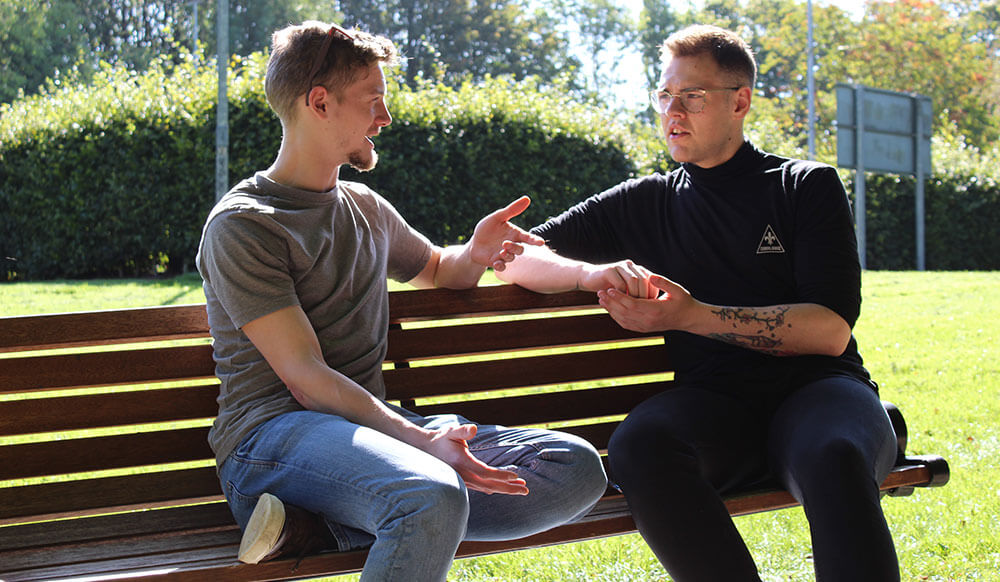How to ask for help
How to ask for help
Asking for help from friends or family can be tough, however it's an important step to feeling better.

Whether we are feeling run down, experiencing low mood, or are in crisis we all need to reach out for support sometimes. You are not alone.
Recent research conducted by Orgyen and the World Economic Forum highlighted that 87% of the global population is affected by mental health difficulties. This can either be through individuals’ own experience or that of someone close to them.
When to ask for help
Many of us wait until things have built up before we ask for support. Although it’s never too late to ask for help, we know the earlier we seek support, the more effective it can be.
When we’re feeling down, it can take a lot of courage to be honest with ourselves, and others. It’s also not unusual to feel guilty, potentially causing upset or worry for someone else if we ask for help. We might feel our parents wouldn’t be able to cope with knowing how bad we feel.
Everyone is worthy of support. Think of what you would say to a friend if they were going through what you are. Chances are you would want to support them whatever way you could.
It’s a good idea to think about how you want to ask for support. There are ways of reaching out that can make the experience a lot easier.

Write about your experience
Writing about our experience can be therapeutic in itself.
How to ask for support
Depending on how you’re feeling, and your situation, it’s up to you to decide how to reach out for help.
Write to someone in text, email, or letter
Writing about our experience can be therapeutic in itself. Be clear about how you would like them to respond to your letter/message. Do you want them to write back or to speak to you in person? Ask that it’s stored somewhere private, so no one else happens across it.
Talk to someone in person
It can be daunting to speak to someone directly. But having the chance to express yourself at length, in a safe and quiet place, has a lot of benefits.
Talk to someone on the phone
Maybe it’s difficult to find the time to see someone, or you need to speak to someone immediately for support. Or being face-to-face with someone is too difficult. If you call unannounced, they could be busy, distracted or in a noisy place, so maybe text first to let them know you want to talk.
Be specific
The more specific you are about what is going on for you, the better.

What can you say when asking for support?
Try to be as honest as you can, however difficult that may be. The more specific you are about what is going on for you, the better. Try some of these as opening lines. What you want to say can flow from there.
“I’m struggling at the moment but I don’t really know what to ask for.”
Sometimes we don’t know what kind of support we need from someone and that’s OK. Not every conversation has to involve a solution. It’s helpful just to talk.
“I’m not feeling great and the things I’m doing don’t seem to be helping. Can you help me to think of ways to feel a little better?”
It might seem like you have tried every solution in the book but nothing seems to work. It’s amazing what a fresh perspective from someone else can do.
“I don’t feel safe on my own, can you stay (on the phone/ come over) for a little while?”
This can be very difficult to say, as it might make us feel vulnerable and exposed. By being direct and honest, we can ensure that we get the support we need, and it will really make a difference.
“I don’t feel great at the moment but I don’t want to talk about it. Can you help me distract myself?”
You’re allowed to speak about your situation without going into detail. If you make a friend or family member aware of your mood, they can support you in whatever way works.
“I’ve not been feeling myself lately…can we stay in contact a little bit more than we used to?”
A visit, call or message from someone you trust can help us feel less alone. Is there anyone in your life that you would benefit from more contact with?

Reach out for support
Reaching out for support, however you decide to do it, is the first step towards things starting to get better.
Not feeling ready to tell friends or family?
Sometimes friends and family are not able to be there for us the way we hope. Or maybe confiding in family or friends feels like too big a step to take right now?
We provide mental health support through video, phone, live chat along with our face-to-face services. Learn more about our 1:1 live chat service here.
Alternatively, online support groups, and listening services like Samaritans phone: 116 123 or Pieta House phone: 1800 247 247 or text HELP to 51444 are good ways of learning to speak about your experience.
Reaching out for support, however you decide to do it, is the first step towards things starting to get better.


Jigsaw Live Chat
Talk to one of our clinicians for online support through our 1:1 webchat.
Live chat

